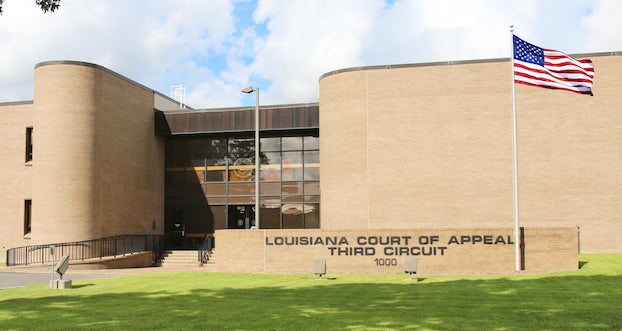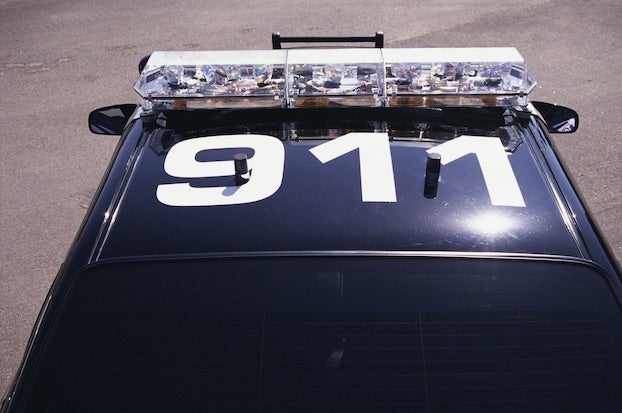Appeals court upholds stay in indigent defense case
Published 5:33 am Sunday, March 10, 2013
The 3rd Circuit Court of Appeals has upheld a ruling by 14th Judicial District Court Judge Wilford Carter ordering a stay of proceedings in Andrew Kyle’s theft and battery charges until money can be found to fund costs of defense.
Because of funding woes in the local Public Defender’s Office, some indigent defense cases have been distributed to local attorneys to be worked for free.
Kyle’s case was one of three assigned to local defense attorney Shane Hinch.
Hinch said he filed a Citizen motion to secure overhead costs.
Carter ordered the stay of proceedings on Oct. 30.
Prosecutor Carla Sigler said she plans to file a writ of appeal with the Louisiana Supreme Court.
Citizen motions originated out of a state Supreme Court decision following rulings by then-14th Judicial District Court Judge Al Gray, including a stay of the state’s murder prosecution of Adrian Citizen until funding for his defense was found.
There are several Citizen motions pending in the 14th JDC; the 3rd Circuit’s decision, as well as the ensuing Supreme Court decision, will likely be used as a referendum.
“I think the impact is going to be that any private attorney who is appointed pro bono to represent an indigent client who files a Citizen motion, I think the court is going to have to grant a stay of that proceeding,” Hinch said.
Still to be determined is whether the prosecution’s clock keeps rolling while funding is being sought.
The state must bring defendants to trial within three years of a charge being filed.
Using the Kyle hearing as reference, Carter initially ruled in another indigent defense case that the clock, or prescription in legal terms, keeps rolling, Sigler said.
But he vacated that ruling based on another 3rd Circuit decision that said a hearing is required before a Citizen motion ruling, she said.
The district attorney’s office plans to meet Monday with all defense attorneys who have filed the motions on behalf of their clients. All the motions are expected to be heard at once on March 20, Sigler said.
Hinch and Adam Johnson, defense lawyers who have each filed Citizen motions in all three of the cases they have been assigned, said the money requested is not for attorney fees.
“It’s a proportionate share of our overhead, which is how much it costs us to keep the doors open, pay our secretaries, paper, those types of things,” Hinch said. “It’s not to give us a fee, it’s to make sure we’re not out of pocket.”
Johnson said he hopes the motions will press the legislature to address the PDO’s funding situation.
“The problem is not going to be addressed until it’s exposed,” he said. “And private attorneys working for free helping the state kick its burden down the road is not going to solve anything.
“This is our way of legally trying to get the problem recognized so that it will actually be fixed.”
Johnson sees the running clock on prosecutions as “the real teeth behind the whole deal.”
“If the prosecution is stayed, that backs up the whole court docket, obviously. But if the prosecution is stayed and the prescription period continues to toll against the state, then that to me is really going to make the legislature get in gear,” he said.
Hinch said he does not foresee every lawyer assigned a pro bono case filing a Citizen motion.
“I thought they would have already and I think that’s what the fear was,” Hinch said, “and that it was going to grind everything to a halt. Certainly I think more people might file if they know they won’t have to fight a writ.
“I think most of the civil lawyers that are appointed are going to go in, take care of the matter and work something out.”
Hinch said he encourages other attorneys assigned cases to file a Citizen motion.
“It’s fair, you can’t expect someone to have to come out of pocket to pay the expense of someone they’re appointed to,” Hinch said. “Now, are they entitled to a fee? The law would say no.”
In the Citizen case, the Supreme Court wrote: “If the trial judge determines that adequate funding is not available, the defendant may then file, at his option, a motion to halt the prosecution of the case until adequate funding becomes available.”
How the courts interpret a following paragraph is vital to whether the prosecution clock keeps running, Hinch said.
“Of course, we do not intend to interfere with the defendant’s right to a speedy trial,” the Supreme Court wrote.
Citizen was accused of beating to death a 12-month-old child, Desnataysha Henry, in 1992.
He was arrested in 2002 and charged with first-degree murder. Citizen was in jail for six years before his case was settled in 2008 when he pleaded guilty to manslaughter.
(mgnonline.com)




